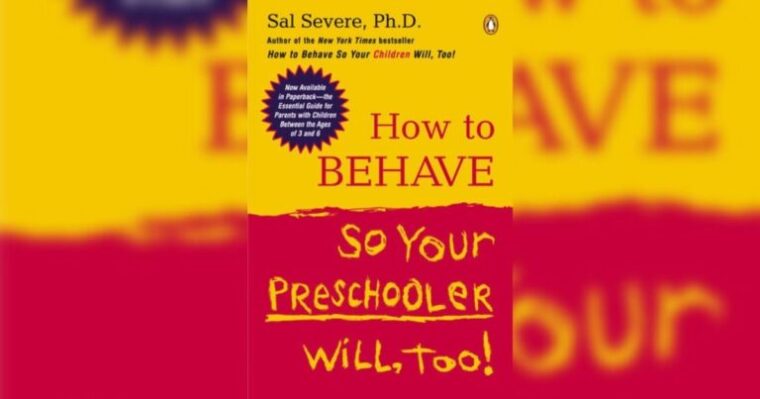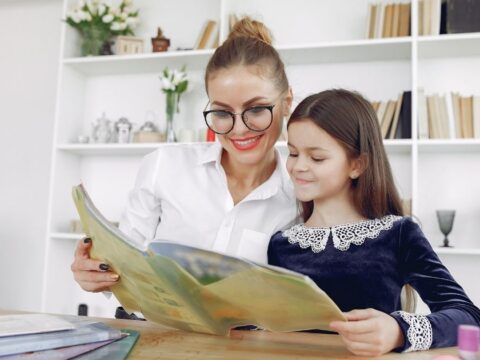How to Behave so Your Preschooler Will, Too! By Sal Severe, Ph.D.
Being a stay-at-home dad is one of the most rewarding jobs I’ve ever had the fortune of doing. I’m learning from my toddler every single day and I get to see him learning too. It’s incredible.
There have been several times when I have called for him and he seemed to just ignore me. I knew his hearing wasn’t an issue because there are times when he has heard something I didn’t even think he’d be able to pick up on. You really do need to watch what you say around kids. Of course, I already knew that. But I didn’t know that he wasn’t deliberately ignoring me on those occasions when he didn’t respond. According to the author, “your child [isn’t] deliberately ignoring you. In most cases, he isn’t but his brain is so absorbed in one thing that he does not process the words you are saying.”
That makes a lot of sense.
Break Through Mental Noise
Another thing to take into account is that when a child is upset or angry, they will have a very hard time listening.
The author writes, “when young children are upset or angry, they are experiencing strong emotions that create a lot of mental ‘noise.’ Children are not good listeners when they are upset. As a result, they are not able to comprehend long sentences . . . Use simple words and phrases.”
Model Good Listening
We should also make sure that we truly listen to our children and show them how they can be attentive to others. It’s an easy thing to do too.
“When your child talks to you, stop what you are doing, and listen. . . Make eye contact. Repeat what he says . . . Be a ‘good listening’ example.”
Never Label a Child
“All children are different so . . . adjusting your parenting style to accommodate your preschooler’s temperament is a productive strategy; labeling your child is not. Children believe what you tell them.
The reality is that most preschoolers act they way you expect them to act. If you tell your son that he is noisy, he will live up to that expectation. If you tell your son that he knows how to play quietly, he will live up to that expectation.”
Classroom teachers know this. It’s the reason most of us use positive words in our class rules. Instead of saying “Don’t yell” we say “Use an indoor voice.”
Use Positive Words and Phrases
“Don’t say, ‘Pick up your toys,’ Say, ‘I need your help. Let’s pick up these toys . . . Say, ‘When you put your clothes in the laundry basket, it really helps me. Thank you.’ Preschoolers are more willing to do things if they feel they are being helpful.
Do not dwell on what it is that you do not want him to do. . . Focus on positive behavior.
Do not say, ‘There is nothing to be afraid of.’ Let your child know that it is okay to be afraid but that you are confident that he is safe.
Whenever you have important topics to discuss with your preschooler, sit or squat down so that you are at his level. Make eye contact. This lets your child know that the ensuing conversation is special and important.”
Admit Your Mistakes
“It is always better for you and your child if you admit your mistake and take responsibility for your own behavior. Do not get defensive when your child catches you misbehaving; instead take advantage of the situation, which offers a teachable moment. Turn your discomfort into a valuable learning opportunity.”
Be Consistent
“Reward a child’s tantrum once, and you will be teaching your child to have more tantrums in the future . . . it is the pattern that you are establishing whine and win.
The hardest part about being consistent is being consistent all the time. Being consistent 90 percent of the time is not enough for most children. If you give in even once in a while, they win once in a while. This teaches preschoolers to be opportunists. They learn to persist in a negative way; every once in a while it works, so it is worth the chance. If preschoolers whine and tease and even occasionally get their way, they win. They learn that whining and teasing work.
Don’t Forget to Play
I read this book partly because I refuse to grow up. I’m a big kid and I make sure to play with my son every day. But I set a good example and do my best to provide educational experiences. We read a lot. He also sees me reading. I am glad that we celebrate the written word in this family. It’s great!





